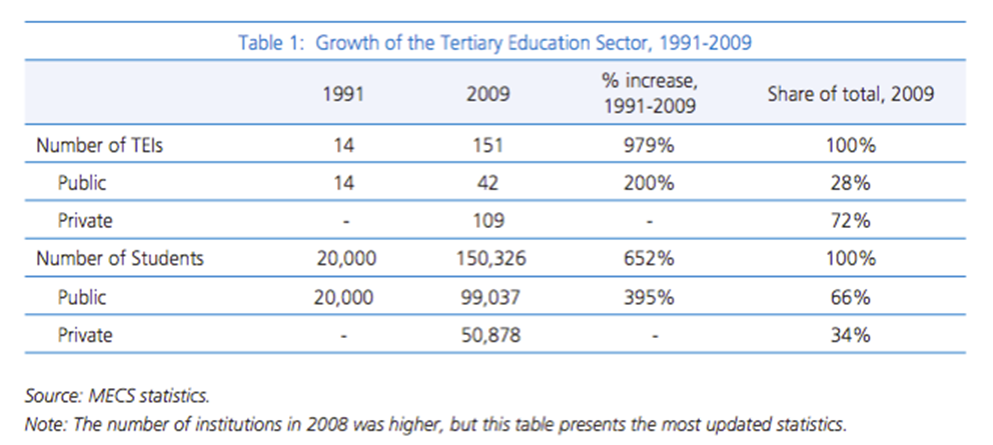Memo #234
By Matthew Neckelmann – mneckelmann [at] gmail.com
 The Mongolian economy is booming and continues to enjoy an extremely high GDP growth rate. Economic opportunities for citizens in urban and rural settings abound. Mining is a major portion of the economy, with the massive Oyu Tolgoi mining project accounting for a third of Mongolia’s GDP. While World Bank development projects focus on infrastructure development, economic governance and institutional strengthening of the mining sector, the demand for a sufficiently educated Mongolian workforce remains unmet.
The Mongolian economy is booming and continues to enjoy an extremely high GDP growth rate. Economic opportunities for citizens in urban and rural settings abound. Mining is a major portion of the economy, with the massive Oyu Tolgoi mining project accounting for a third of Mongolia’s GDP. While World Bank development projects focus on infrastructure development, economic governance and institutional strengthening of the mining sector, the demand for a sufficiently educated Mongolian workforce remains unmet.
This is not due to lack of higher education: the number of tertiary education institutions grew rapidly from 1991-2001. In the 2000s, education in Mongolia meant big business: rising tuition fees made the private education sector an attractive investment opportunity.
But the growth of private education has failed to train a workforce for the mining-based economy. Three key factors limit development of Mongolian tertiary education. First, there are too few well-trained professors, as low wages (around US$300 a month) discourage qualified personnel from pursuing academic careers. Second, the skills of many students who have studied subjects like business and liberal arts do not match the requirements of the mining sector, where skills in science and technology are needed. Lastly, access to education by students from low-income and rural families is limited because the majority of tertiary institutions are located in Ulaanbaatar and education costs are high.
As a consequence, skilled migrant workers from China take mining jobs that would otherwise go to Mongolians. However, many mining contracts require a certain percentage of the workforce for a particular project to be Mongolian. As demand continues to grow, workforce deficits are bound to become more problematic.
Further private investment focusing on providing training for specific skills that are in high demand might seem like a viable solution, but the education sector’s growth in recent years has done little to solve skill deficit issues. Another option is directing aid from organizations like the World Bank to subsidize education for specific in-demand skills. As the economy continues to grow, the Mongolian government may find it cost effective to subsidize the education and training required for future workers in the mining industry.
About the Author:
Matthew Neckelmann is a candidate for a JD and MA in Asia Pacific Policy Studies at the University of British Columbia.
Links:
- Higher Education Mongolia Policy Note, The World Bank
- Overeducated? The Impact of Higher Education Expansion in Post-Transition Mongolia, Columbia University Academic Commons
- Improving Labour Market through Higher Education Reform Project in Mongolia, The Asian Development Bank
Related Memos:
- See our other memos on Mongolia

Comments are closed, but trackbacks and pingbacks are open.